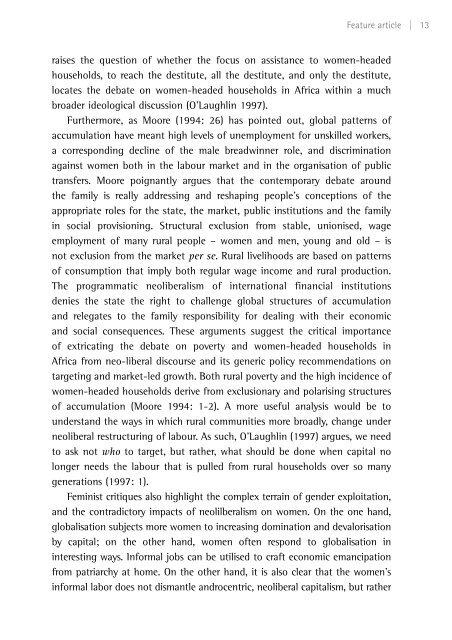Create successful ePaper yourself
Turn your PDF publications into a flip-book with our unique Google optimized e-Paper software.
Feature article | 13<br />
raises the question of whether the focus on assistance to women-headed<br />
households, to reach the destitute, all the destitute, <strong>and</strong> only the destitute,<br />
locates the debate on women-headed households in Africa within a much<br />
broader ideological discussion (O’Laughlin 1997).<br />
Furthermore, as Moore (1994: 26) has pointed out, global patterns of<br />
accumulation have meant high levels of unemployment for unskilled workers,<br />
a corresponding decline of the male breadwinner role, <strong>and</strong> discrimination<br />
against women both in the labour market <strong>and</strong> in the organisation of public<br />
transfers. Moore poignantly argues that the contemporary debate around<br />
the family is really addressing <strong>and</strong> reshaping people’s conceptions of the<br />
appropriate roles for the state, the market, public institutions <strong>and</strong> the family<br />
in social provisioning. Structural exclusion from stable, unionised, wage<br />
employment of many rural people – women <strong>and</strong> men, young <strong>and</strong> old – is<br />
not exclusion from the market per se. Rural livelihoods are based on patterns<br />
of consumption that imply both regular wage income <strong>and</strong> rural production.<br />
The programmatic neoliberalism of international financial institutions<br />
denies the state the right to challenge global structures of accumulation<br />
<strong>and</strong> relegates to the family responsibility for dealing with their economic<br />
<strong>and</strong> social consequences. These arguments suggest the critical importance<br />
of extricating the debate on poverty <strong>and</strong> women-headed households in<br />
Africa from neo-liberal discourse <strong>and</strong> its generic policy recommendations on<br />
targeting <strong>and</strong> market-led growth. Both rural poverty <strong>and</strong> the high incidence of<br />
women-headed households derive from exclusionary <strong>and</strong> polarising structures<br />
of accumulation (Moore 1994: 1-2). A more useful analysis would be to<br />
underst<strong>and</strong> the ways in which rural communities more broadly, change under<br />
neoliberal restructuring of labour. As such, O’Laughlin (1997) argues, we need<br />
to ask not who to target, but rather, what should be done when capital no<br />
longer needs the labour that is pulled from rural households over so many<br />
generations (1997: 1).<br />
Feminist critiques also highlight the complex terrain of gender exploitation,<br />
<strong>and</strong> the contradictory impacts of neolilberalism on women. On the one h<strong>and</strong>,<br />
globalisation subjects more women to increasing domination <strong>and</strong> devalorisation<br />
by capital; on the other h<strong>and</strong>, women often respond to globalisation in<br />
interesting ways. Informal jobs can be utilised to craft economic emancipation<br />
from patriarchy at home. On the other h<strong>and</strong>, it is also clear that the women’s<br />
informal labor does not dismantle <strong>and</strong>rocentric, neoliberal capitalism, but rather


